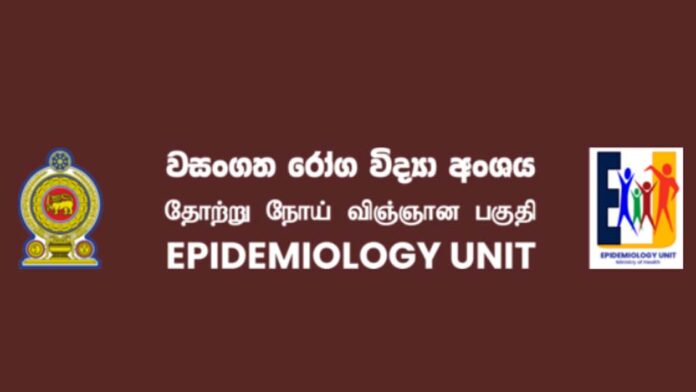Colombo (LNW): Sri Lanka faces minimal risk from the Nipah virus that recently emerged in neighboring India, a statement by the Health Promotion Bureau of Sri Lanka said.
As per the Epidemiology Unit of Sri Lanka’s Health Ministry, Kerala, India reported 6 Nipah virus cases since the outbreak began in late August 2023, leading to two deaths. More than 700 individuals, suspected to have come into contact with infected patients, were quarantined and tested with no positive results as of September 22.
Kerala authorities have shut down certain public areas as a safety measure. This marks the fourth Nipah outbreak in Kerala in five years. Each time, effective and swift measures were taken to contain the virus.
Full statement;
Nipah virus (NiV) is a zoonotic virus, transmitted predominantly from fruit bats and through food which has been contaminated by body fluids or secretions of infected animals, including directly from human to human via prolonged close contact. In infected people, it can cause a range of illnesses from asymptomatic infection to acute respiratory illness and fatal encephalitis.
Nipah virus was first recognized in 1998 in Malaysia during an outbreak among pig farmers. In total, around 265 people were infected. Thereafter, a small outbreak in Singapore was also reported with a total of 11 infected people. Since then, no further outbreaks had been reported in Malaysia. No spread to other countries was also noted during this period and both countries were able to successfully control the outbreak without international spread. From 2001, the virus again emerged in Bangladesh and frequent small-scale outbreaks have flared up on and off in that country since. The disease was also identified in eastern India (Bengal region) in 2001 and since then, few sporadic small-scale outbreaks have occurred. All such outbreaks have thus far been well controlled and not spread beyond the local area of origin.
The latest outbreak in the South Indian State of Kerala, emerged in late August 2023. Up to now, 6 people have been infected of which 2 have died. Over 700 people who were suspected to be potential contacts of the infected patients have been quarantined and tested for the infection, with no positive reports as of 22.09.2023. As a precautionary measure and to mitigate potential spread of the disease, the state authorities initiated closure of selected public places in the area of origin of the disease. This is the fourth Nipah outbreak to hit Kerala in the past 5 years. Each time, the disease has been well controlled and timely precautionary measures have been taken to ensure that there is no spread beyond the area of origin of the outbreak.
In general, transmission of the disease can occur in several ways – either through unprotected exposure to secretions/tissues from infected animals, or through consumption of fruits or fruit products contaminated with urine or saliva from infected fruit bats. Human to human transmission has so far only been reported mainly by close contacts of the infected patients, via the infected person’s urine, saliva, blood or other secretions.
Human infection ranges from asymptomatic infection to acute respiratory infection (mild or severe) and fatal encephalitis. Infected people usually develop fever initially, followed by headaches, myalgia, vomiting and sore throat. This can be followed by dizziness, drowsiness, altered consciousness and neurological signs indicating acute encephalitis. Some patients can also have pneumonia and other respiratory illnesses including acute respiratory distress. Seizures and encephalitis can occur in severe cases.
The incubation period is believed to range from 4 to 14 days. Most people who survive acute encephalitis make a full recovery, but long-term neurologic conditions have been reported in some survivors. The case fatality rate is estimated at 40 – 75%. However, this rate can vary by outbreak depending on the local capabilities for epidemiological surveillance and clinical management.
Diagnosis is usually through clinical history and main tests involved include RT-PCR from body fluids and ELISA testing. Other tests include PCR assay and virus isolation by cell culture.
There are currently no specific drugs or vaccines for the Nipah virus. Mainstay of treatment is intensive supportive care to treat severe respiratory and neurologic complications.
Fruit bats are the natural reservoir for the Nipah virus. There is no apparent disease in fruit bats. The Nipah virus can cause outbreaks in some domestic animals, primarily pigs where it is highly contagious. An infected pig can exhibit no symptoms, but some can develop feverish illness.
Prevention is mainly through raising awareness of the risk factors and education of the community among the measures that can be taken to reduce exposure to the Nipah virus, by reducing risk of bat-to-human, animal-to-human, and human-to-human transmission. These include thoroughly washing fruits and peeling, prior to consumption including discarding of contaminated fruits or those with animal bites. When handling sick animals or their tissues, protective clothing including gloves and face shields should be worn. Important to avoid close unprotected physical contact with diagnosed Nipah virus-infected patients. Regular handwashing should be carried out after caring for or visiting sick people. Health care staff caring for patients with suspected or confirmed infection, or if handling specimens from them, should implement standard infection control precautions at all times. These measures should also be followed, especially by those travelling to infected areas/localities.
Considering the disease epidemiology, and current outbreak control measures that have been implemented in areas such as Kerala, in the current context, the risk to Sri Lanka is minimal and there is no need for the public to panic. Furthermore, the Health Ministry is closely monitoring the situation and will advise the public on measures to be taken as the need arises.

